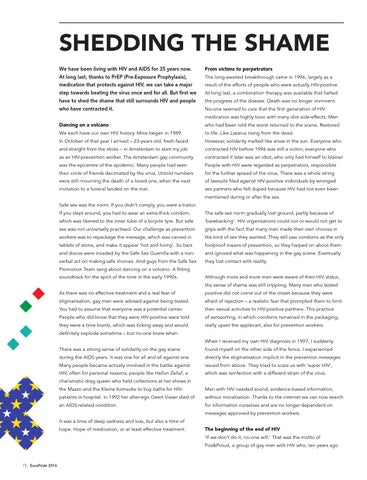SHEDDING THE SHAME We have been living with HIV and AIDS for 35 years now.
From victims to perpetrators
At long last, thanks to PrEP (Pre-Exposure Prophylaxis),
The long-awaited breakthrough came in 1996, largely as a
medication that protects against HIV, we can take a major
result of the efforts of people who were actually HIV-positive.
step towards beating the virus once and for all. But first we
At long last, a combination therapy was available that halted
have to shed the shame that still surrounds HIV and people
the progress of the disease. Death was no longer imminent.
who have contracted it.
No-one seemed to care that the first generation of HIV medication was highly toxic with many dire side-effects. Men
Dancing on a volcano
who had been told the worst returned to the scene. Restored
We each have our own HIV history. Mine began in 1989.
to life. Like Lazarus rising from the dead.
In October of that year I arrived – 23-years old, fresh-faced
However, solidarity melted like snow in the sun. Everyone who
and straight from the sticks – in Amsterdam to start my job
contracted HIV before 1996 was still a victim; everyone who
as an HIV-prevention worker. The Amsterdam gay community
contracted it later was an idiot, who only had himself to blame!
was the epicentre of the epidemic. Many people had seen
People with HIV were regarded as perpetrators, responsible
their circle of friends decimated by the virus. Untold numbers
for the further spread of the virus. There was a whole string
were still mourning the death of a loved one, when the next
of lawsuits filed against HIV-positive individuals by wronged
invitation to a funeral landed on the mat.
sex partners who felt duped because HIV had not even been mentioned during or after the sex.
Safe sex was the norm. If you didn’t comply, you were a traitor. If you slept around, you had to wear an extra-thick condom,
The safe sex norm gradually lost ground, partly because of
which was likened to the inner tube of a bicycle tyre. But safe
‘barebacking’. HIV organisations could not or would not get to
sex was not universally practised. Our challenge as prevention
grips with the fact that many men made their own choices in
workers was to repackage the message, which was carved in
the kind of sex they wanted. They still saw condoms as the only
tablets of stone, and make it appear ‘hot and horny’. So bars
foolproof means of prevention, so they harped on about them
and discos were invaded by the Safe Sex Guerrilla with a non-
and ignored what was happening in the gay scene. Eventually
verbal act on making safe choices. And guys from the Safe Sex
they lost contact with reality.
Promotion Team sang about dancing on a volcano. A fitting soundtrack for the spirit of the time in the early 1990s.
Although more and more men were aware of their HIV status, the sense of shame was still crippling. Many men who tested
As there was no effective treatment and a real fear of
positive did not come out of the closet because they were
stigmatisation, gay men were advised against being tested.
afraid of rejection – a realistic fear that prompted them to limit
You had to assume that everyone was a potential carrier.
their sexual activities to HIV-positive partners. This practice
People who did know that they were HIV-positive were told
of serosorting, in which condoms remained in the packaging,
they were a time bomb, which was ticking away and would
really upset the applecart, also for prevention workers.
definitely explode sometime – but no-one knew when. When I received my own HIV diagnosis in 1997, I suddenly There was a strong sense of solidarity on the gay scene
found myself on the other side of the fence. I experienced
during the AIDS years. It was one for all and all against one.
directly the stigmatisation implicit in the prevention messages
Many people became actively involved in the battle against
issued from above. They tried to scare us with ‘super HIV’,
HIV, often for personal reasons; people like Hellun Zelluf, a
which was reinfection with a different strain of the virus.
charismatic drag queen who held collections at her shows in the Mazzo and the Kleine Komedie to buy baths for HIV-
Men with HIV needed sound, evidence-based information,
patients in hospital. In 1992 her alter-ego Geert Visser died of
without moralisation. Thanks to the internet we can now search
an AIDS-related condition.
for information ourselves and are no longer dependent on messages approved by prevention workers.
It was a time of deep sadness and loss, but also a time of hope. Hope of medication, or at least effective treatment.
The beginning of the end of HIV ‘If we don’t do it, no-one will.’ That was the motto of Poz&Proud, a group of gay men with HIV who, ten years ago
72 EuroPride 2016
